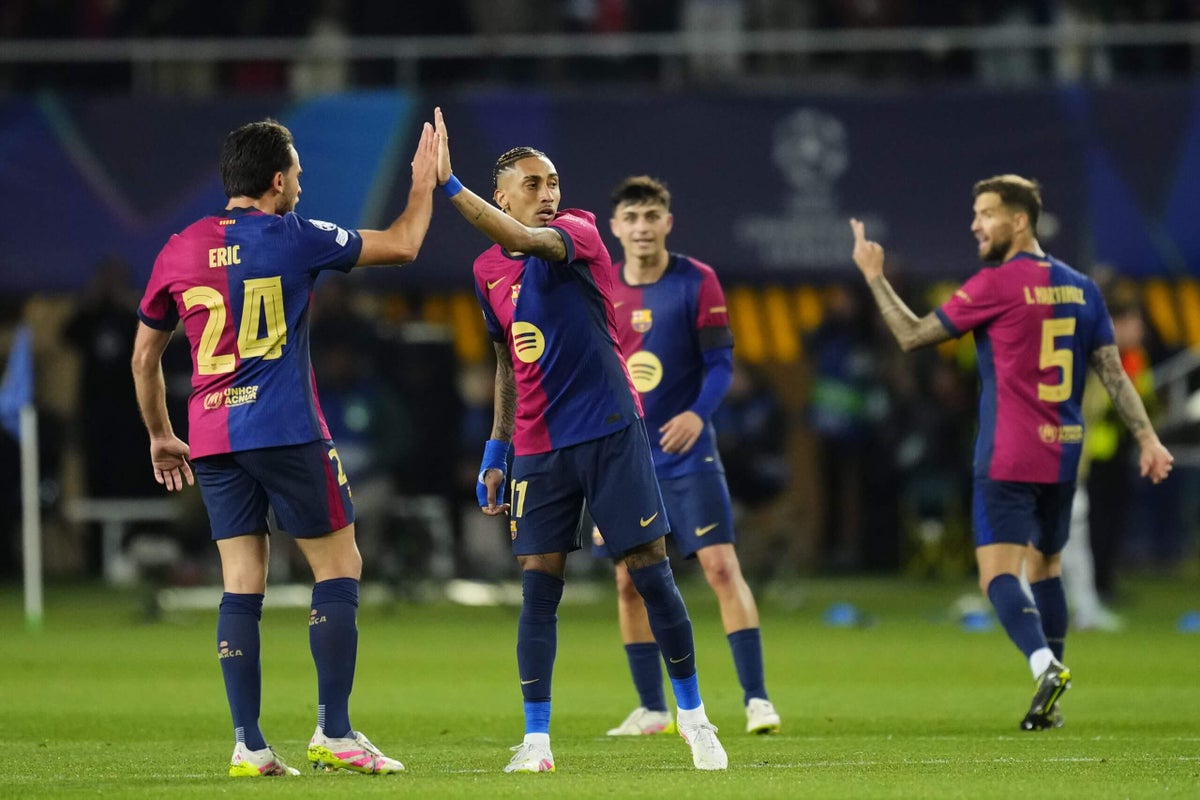“I am extremely proud of the performance my squad has put in, because tonight we faced one of the most offensive and beautiful teams in the world”.
Those were the words of Inter Milan manager, Simone Inzaghi, after the first leg of a thrilling tie in the Champions League semi-finals. Six goals, an endless carousel of highlights and arguably the best game in the competition this season.
Among all the things we learned on Wednesday night, there was the reassurance that Barcelona are the world’s most entertaining team – which does not mean the best.
The way in which Lamine Yamal carried his team in a mind-blowing exhibition, the fact they scored three goals against a team that had only conceded four in 12 games in the Champions League this season, and the mentality the squad in coming back from a two-goal deficit, and then 3-2 down, were a treat to witness. But all of this happened because the Catalans were imperfect, as they have been through the whole season.
Since Hansi Flick took charge last summer, Barca’s approach in games has been thrilling but self-destructive. They are defined by an extremely high defensive line, which they combine with a relentless counter-press. Flick’s system has been generally well adjusted during the season, and his squad’s offensive firepower has brought them to where they are right now — in sight of a remarkable treble of La Liga, Champions League and Copa del Rey (which they won in similarly ridiculous fashion last weekend).
But their football is a high-wire act, and it feels like every play in a game has only two potential outcomes: Barcelona suffocates their opponent and destroys them, or as soon as a team slides through their first line of pressure, they find a vulnerable defence to capitalise on.
That was perfectly exposed in the Inter game. According to UEFA, Barca registered 14 shots against Inter. They scored three goals and hit the woodwork two more times. Meanwhile, Inter had seven shots, three of them on target that ended up in goal, and had a fourth one disallowed because Henrikh Mkhitaryan’s toe was somehow in an advanced position.

This is the price Flick has to pay in order to play like Barca do. The most extreme example is probably Yamal, a precocious talent who makes the difference like nobody else in the offensive end. But that attacking output is offset by the knowledge that he will be less active in off-the-ball pressing or defending.
Frenkie de Jong is similar. He is a luxury of a holding midfielder, a gifted technician that does not lose a ball, can split pressing lines driving the ball and is in the best form of his Barca career. However, as soon as he is not in possession, you will see him struggling to feel the gaps in defence, being as aggressive on duels as he should be and making the team more vulnerable.
“We are not going to back down on our plan — in fact, I’d say the opposite,” said a source in Barcelona’s backroom staff, who prefers to remain anonymous in order to protect their position, in the build-up to the Inter game. “We’ll double our trust in the approach we have to the game. We’ll keep playing as radical as you’ve seen.”

Lamine Yamal is a genius on the ball but offers little protection (Lluis Gene/AFP via Getty Images)
Inter manager Simone Inzaghi went on the same line while speaking to Italian broadcasters after the game. “Barcelona strategy is very risky, but it pays off,” he said. “They’ve scored over 150 goals, have already won two titles, and are still competing for two more.”
What happened in the first leg of the Champions League semi-finals is not news to Barcelona. They arrived at the game after Saturday’s fascinating Copa del Rey final against Real Madrid, when they won 3-2 with a comeback sealed in extra-time.
A week earlier, they came back from 3-1 down against Celta de Vigo to claim another injury-time win in La Liga. Over the last five games Barca played across all competitions, they have conceded 11 goals.
There might be an explanation behind this recent tendency, though: Barca players are exhausted, and some are injured.
Robert Lewandowski and Alejandro Balde were not available for the first leg, with backups Ferran Torres and Gerard Martin replacing them. Now, Jules Kounde is very likely to miss the second leg through a hamstring injury suffered against Inter. Meanwhile, Pedri, arguably their most influential player, has spent so long on the pitch this season that he can hardly complete 90 minutes.
“It’s not easy, when you play every three days, to train things as you’d want,” said Flick during his post-match media duties. “This is the situation. Kounde’s injury is also about playing every three days. It happens.”
It all comes at a time where Barca are facing some of the best squads in Europe as they pursue the treble. But the dressing room is not worried by that.

Frenkie de Jong says Barcelona will not sacrifice their principles (Carl Recine/Getty Images)
“It’s good to see what we do because we like to play attacking football, control the game and score goals,” said De Jong after the game. “We take some risks with that, but I think we also obtain many good things, so will keep having the same mentality.”
“We wanted more,” added Yamal. “I believe we could have won the game. I’m happy to help the team but I always want to win and that’s why I ended the game a bit bitter. But we will go again like we did today. We are focused on the second leg, and we’ll go right after them.”
Hold on tight: next Tuesday’s decider in Milan promises to be a must-watch.
(Top photo: Jose Breton/Pics Action/NurPhoto via Getty Images)

